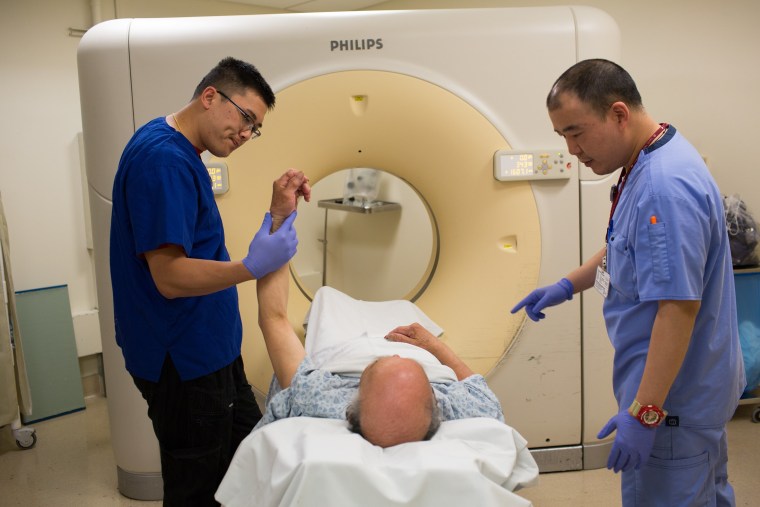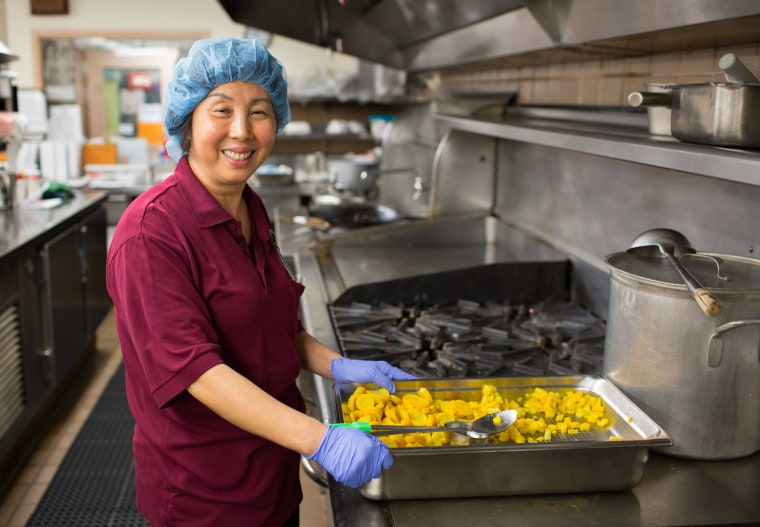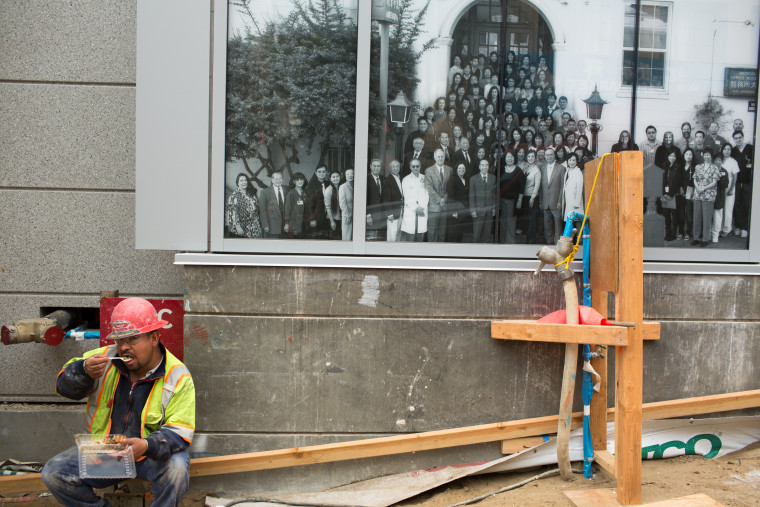At Chinese Hospital in the heart of San Francisco’s Chinatown, the kitchen serves jook, rice porridge, and macaroni soup with diced ham. Doctors, nurses, and staff speak Cantonese and Mandarin. And around Lunar New Year, grateful patients drop off gifts of tea, oranges, and moon cakes.
Ninety years ago, at a time when other hospitals in San Francisco discriminated against the Chinese, denying treatment, community leaders banded together to create this space.
“This systematic exclusion only perpetuated the prevailing beliefs that the Chinese were spreading diseases and were a 'sickly race' because they had limited access to services that would help to improve their conditions," writes Laureen Hom, a doctoral student at UC Irvine’s School of Ecology. "Not surprisingly, the push for fixing the health problems of Chinatown had to come from within the community.”
Today, this facility remains the only Chinese operated and governed independent hospital in North America.
In 1925, the hospital opened its doors on Jackson Street, offering services designed around the language and culture of their patients, who spoke little or no English. Martial arts hero Bruce Lee was born here in 1940. The hospital added a building in 1979, and is undergoing construction to expand to 76 beds by the end of next year, serving patients who are primarily working class and elderly. It’s a block from a squat Presbyterian church founded by missionaries in 1894, and across the street from bustling seafood and vegetable markets.
Some patients have been coming here for decades, and over time, they've brought their children and grandchildren for treatment, served by families who have worked at Chinese Hospital for generations. In an era of often rushed, impersonal medicine, such loyalty among patients and staff seems quaint, and remarkable.
Bonnie Louie, an ebullient nursing supervisor, calls herself a “Chinatown girl.” Born at the hospital in 1952, she received stitches and underwent a tonsillectomy in its wards as a child. An alumna of nearby Francisco Middle School, Lowell High, and City College, she spent her entire career here.

“I’ll never forget [the 1989 earthquake] Loma Prieta. Everyone came into the lobby as a place of refuge. They’d lost their power and didn’t feel safe in their apartments," recalled Louie. "They asked, ‘Can we stay here?’ We had heat and light. Whenever they don’t know what to do, they come into the lobby to ask. ‘We don’t understand this piece of paper. Can you translate it?’"
The hospital, Louie says, is the "heartbeat for Chinatown."
Her sense of pride and duty inspired her daughter, Randi Loke, 29, to join the hospital, though that legacy raised the stakes when she was taking her licensing exam. “If I didn’t pass, I was letting down not only me, but my mother and the hospital," said Loke. "I felt even more pressure to become a great nurse, to become just as good as her.”
Often patients ask Loke if her parents sent her to Chinese school, if she grew up in Chinatown, in Hong Kong or China. “I tell them both my parents are American-born, and that I learned a lot from my grandparents," said Loke. "And then they’ll start talking about their kids and grandkids, how proud they are about all the things they have accomplished in America. That’s the best.”
"People don’t treat you like a doctor. They treat you like a friend, more than anywhere else.”
In the 1980s, a wave of foreign-born doctors was immigrating to the United States. Among them was Martin Leung, a general practitioner and a mischievous storyteller. The Hong Kong native prides himself on the bonds built with patients over the years - leading to vacations together, mahjong games, and shared meals.
“They tell me, ‘You cannot retire, because we grew up with you. Don’t retire, I want to die with you,’” said Leung, 66. “This is the difference between retiring and keeping my practice: If I retire, I call friends up to chit chat, we go out, and pay the bill. Now I can chit chat with them, and collect money from insurance! That’s good incentive for me not to quit."
Chinatown, Leung says, is like "a small rural town" inside a metropolis."There’s a sense of welcoming, belonging," he said. "People don’t treat you like a doctor. They treat you like a friend, more than anywhere else.”
On childhood visits to the hospital, Leung's son, Man-Kit, used to find Chinatown crowded, dingy, and dirty. “I remember going to my dad’s office, doing homework," he said, "trapped in the back room, thinking ‘I don’t know why anyone would want to work here.’”
In high school, the younger Leung volunteered at the hospital, using his Cantonese language skills to help patients get placed in nursing facilities, and in the process, he says he discovered his cultural inheritance. “Even though I myself don’t identify as a first-generation immigrant, many of my family and friends are like the patients in Chinatown. They’re like my uncles and grandmas,” said Leung, 38.
Often, father refers patients to son - an ear, throat, and nose specialist educated at Harvard and the University of California, San Francisco. “He’ll call me up and say, ‘I need someone squeezed in,’" said the younger Leung, "and tell his patients, ‘Go see my son, he can fit you in this week.’ It’s a family personal connection.”

Shu-Wing Chan and his eldest daughter, Mai-Sie, share a desk in their tiny office. They sit on opposite sides, facing each other if they’re catching up on paperwork. He joined the hospital in 1976, as a cardiologist and doctor of internal medicine, after turning down jobs in Minneapolis and Hong Kong. “I felt more useful and needed," Chan said, not only at the hospital, but in Chinatown too, where he has served on the board of medical and community service organizations. He encouraged his daughter to join his practice in 2004, eager for her to experience the same kind of engagement. “It’s a unique opportunity not to many people will get," he said.
Chan and his wife had raised their four children to value education and harmony, to work within the system. The soft-spoken 70-year-old has no plans to retire, not while his daughter is busy with her toddler son. Today, she brings her son to visit the hospital, just like her father used to bring her.
Chinese Hospital doesn’t offer neurosurgery, cardiac surgery, and other super subspecialties, emphasizing quality of life and culture familiarity rather than the most flashy and modern care. “A lot of us do the traditional thing of seeing our own patients if they get admitted,” said Mai-Sie, 40, a Stanford graduate and internist with a thorough, thoughtful manner.
"The hospital, the people – it feels much more like a community and a family."
According to Mai-Sie, when one elderly patient broke her hip, she waited overnight for the van service to take her to Chinese Hospital, rather than calling 911 and risk getting whisked to a hospital where she couldn’t easily communicate with staff.
Mai-Sie understands. To her and her patients, the hospital is more than a medical institution.
Tapped for a “Dancing with the Stars” competition at the holiday party, she took lessons with a professional instructor, performing Argentine tango and the Lindy hop. Though she and her partner narrowly lost the title, they started dating and later married. The hospital where her family had cared for so many led to her own.
"It would have been nice to go somewhere else to get another experience and bring it back, but now that I’ve been here, I’m committed," she said. "The hospital, the people – it feels much more like a community and a family."

Like NBC Asian America on Facebook and follow us on Twitter.